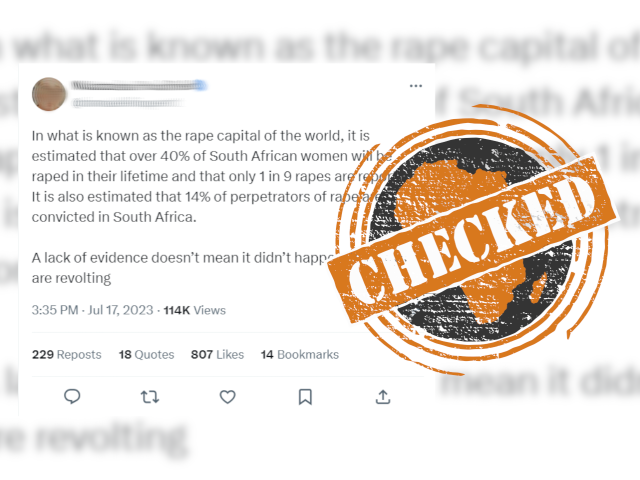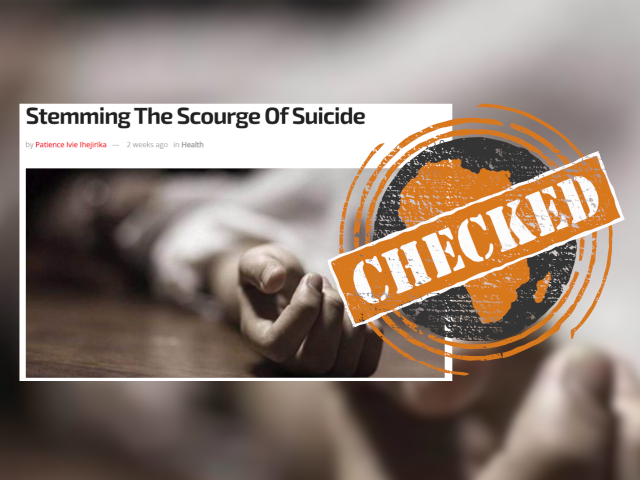-
The statistic was attributed to both the World Health Organization and the United Nations by the BBC, but has subsequently been corrected or taken down from some of the broadcaster’s platforms.
-
WHO and UN officials confirmed the figure was in fact for global deaths in 2016.
-
Experts advised looking at road traffic death rates for comparative purposes between countries, rather than total number of deaths, and these are highest in Africa.
Do “over a million Africans die in road accidents every year”? That was the statistic shared by the BBC’s Focus on Africa podcast.
“The World Health Organization (WHO) has released statistics saying 1.35 million people die every year in road accidents on the African continent,” text on the Focus on Africa website reads. In a tweet promoting the podcast the statistic is attributed to the United Nations (UN).
A South Africa-based journalist contacted Africa Check about the claim. He tweeted: “But if traffic killed more people in Africa than HIV and malaria combined we would know about it. @AfricaCheck would you have a look at this outrageous claim by @BBCAfrica?”
So we got to work.
Claim removed from some platforms
The original description of the podcast said that the interview was with “Benita Sako” who was described as the “WHO road safety expert at the organisation’s regional office for Africa”. According to her LinkedIn profile and other mentions online, Sako’s first name is “Binta”.
In the interview she said that Africa is a “continent with the heaviest burden of road fatalities”. But she didn’t say that “over a million Africans die in road accidents every year”.
We contacted the BBC to ask for the source of the claim but received no response.
Subsequently the text on some of the broadcaster’s platforms was changed to read: “Thousands of Africans die in road accidents every year.”
1.35 million deaths globally
Africa Check spoke to Sako, who is a WHO technical officer. She said the figure of 1.35 million road deaths was for the whole world in 2016.
Jean Todt, the UN special envoy for road safety, also confirmed that the BBC’s claim was incorrect.
How many road deaths were recorded in Africa? The most recent WHO estimates show that 297,087 deaths occured in the region in 2019. This represented 23% of 1,282,150 deaths globally.
Todt told Africa Check the WHO estimates were based on “a broad assessment of the road safety situation in 178 countries”. The data was drawn from the WHO’s Global Status Report on Road Safety which surveys countries. (Note: The WHO’s Africa region covers 47 of the continent’s 55 countries.)
|
Region |
Estimated number of road traffic deaths (2019) |
|
Africa |
297,087 |
|
Americas |
154,780 |
|
South-East Asia |
317,069 |
|
Europe |
68,863 |
|
Eastern Mediterranean |
126,958 |
|
Western Pacific |
317,393 |
|
Global |
1,282,150 |
Source: World Health Organization
The figures include the deaths of motorists, passengers and pedestrians within 30 days of a road accident. Source: World Health Organization
Road traffic death rate highest in Africa
Both Todt and Sako advised comparing countries by their road traffic death rates, not the number of deaths.
“It’s important to put numbers in context. The rate gives you more of the significance of the burden of deaths in the African region,” Sako explained.
According to the WHO: “Road traffic injury death rates are highest in the African region.” This stood at 27.2 deaths per 100,000 people in 2019. Europe had the lowest death rate at 7.4 and the global rate was 16.7.
|
Region |
Estimated road traffic death rate (2019) |
|
Africa |
27.2 |
|
Americas |
15.3 |
|
South-East Asia |
15.8 |
|
Europe |
7.4 |
|
Eastern Mediterranean |
17.8 |
|
Western Pacific |
16.4 |
|
Global |
16.7 |
Source: World Health Organization
44% of African deaths are pedestrians and cyclists
Globally the WHO has identified groups that are at risk of being killed in road accidents. These include children, young adults and people with lower socioeconomic status.
“More than 90% of road traffic deaths occur in low- and middle-income countries,” it notes. “Even within high-income countries, people from lower socioeconomic backgrounds are more likely to be involved in road traffic crashes.”
Todt said the data showed that the Africa region had the highest proportion of pedestrian and cyclist mortalities, which accounted for 44% of all deaths.
Conclusion: BBC wrong about road deaths in Africa
A BBC Focus on Africa podcast reported that “over a million Africans die in road accidents every year”. It attributed this statistic to both the World Health Organization and the United Nations.
However, the latest data shows that this is the figure for global road accident deaths. In 2019, an estimated 297,087 people died due to road accidents in the Africa region.
We rate this claim as incorrect.
The region does, however, have the world’s highest road accident death rate.
Photo by Jekesai Njikizana from AFP





Add new comment